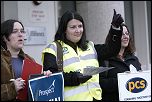 OVER
OVER
200,000 civil servants went on strike on 5 November, against the
government’s threat to 104,000 jobs and attacks on pensions, pay and
sick leave.
This was the first all-civil service strike since 1993 and a
resounding response to these attacks. There was very little press
coverage about the strike but we have received reports from all over the
country.
Below are just extracts from those inspiring reports.
AFTER A 1,200-strong demonstration through central London, a packed
rally heard PCS general secretary Mark Serwotka report on how successful
the day’s strike action had been. He outlined the next stages of the
campaign.
Ken Smith
He said that despite press speculation that the strike wouldn’t be a
success there had been the most incredible response to the appalling
treatment of low-paid civil servants.
Fifteen general secretaries of national trade unions were speaking at
50 rallies in support of the PCS.
Over 200,000 civil servants were on strike and even TGWU members in
the government’s car service had refused to cross the picket lines. No
ministerial cars were being cleaned, serviced or used that day.
In Northern Ireland, over 90% of Inland Revenue staff were on strike
and in Liverpool only eight staff out of 148 in the Department for Work
and Pensions (DWP) offices were working. PCS members in the Royal Parks
were on strike for the first time in their history. Over 500 were
marching in Nottingham.
Coventry’s Department for Work and Pensions (DWP) offices were
completely shut. Management had conceded that 176 DWP offices were
completely closed. Museums, libraries and even arbitration service ACAS
were on strike.
Mark Serwotka warned that if there was any threat of any compulsory
redundancy the union would take industrial action. He said: "We
will rock the boat as hard as we can to make sure this is a general
election issue."
After thanking other unions for their support he said: "If the
government do not change tack then all the public-sector unions need to
consider millions of us taking action to tell the government to stop
robbing our pensions and stop treating public servants with
contempt."
Later in the rally in response to questioning from the floor he
elaborated on this: "Early in 2005 we want a national one-day
strike involving teachers, local-government workers and other public
sector-workers."
His remarks were greeted with a huge, prolonged standing ovation.
Dave Prentis, general secretary of public-sector union UNISON later
said: "We will unite with you to fight these cuts" and
"would stand shoulder to shoulder with PCS until the cuts are
withdrawn."
He said if this meant UNISON members taking action then "we will
take it" but did not go on to specify what type of action he
envisaged.
Andy Gilchrist, general secretary of the firefighters’ union FBU was
given a warm welcome in recognition of the firefighters’ strike action
in 2002-2003.
However, he was met with stony silence when he lectured the rally
that "there are thousands of people in the Labour Party who will
support you and don’t ever forget that."
A day to be proud of the union
OUTSIDE LONDON the biggest rally of the day was in Glasgow where over 800 members attended in the city centre. The mood was fantastic, determined and united. Pickets were out all over the city from early in the morning and on most streets PCS placards and banners were present. Members from Edinburgh, Ayrshire and Fife organised buses to attend the rally.
The packed rally heard contributions from Janice Godrich, PCS President, Bill Speirs Scotland TUC general secretary and Eddie Reilly, PCS Scottish Secretary. Janice, a member of International Socialists, the Socialist Party’s counterpart, told the meeting:
“Today is a day to be proud, of your union, of your colleagues but most of all of yourselves. But it is also a day to be angry, angry that it’s taken a day of industrial action by low-paid members to make this government listen to PCS members. There has been no case given for these job cuts and members have shown that they will not be used as a political football in the run up to the general election.”
She concluded by thanking members for their support and
“myself, Mark Serwotka and the NEC guarantee that we will continue this campaign with determination and vigour until our jobs are secure, our pensions are secure and our conditions are secure.”
After the rally all 800 members marched through Glasgow city centre. In a final contribution, Alan Brown, NEC member, told the strikers that the next stage in the campaign was a demonstration in chancellor Gordon Brown’s constituency before the end of the year and increasing the pressure on other public sector unions to join our campaign.







